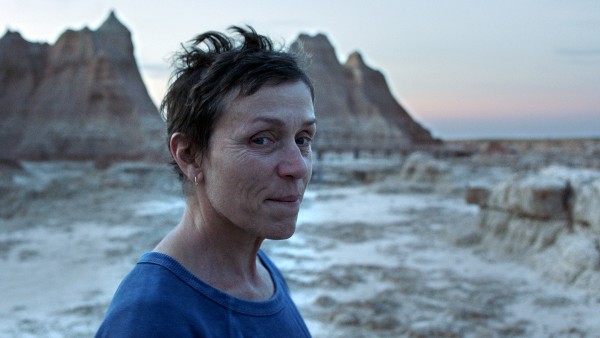Our producer-at-large Father Vince Kuna, C.S.C., a 2016 USC film-school grad, does a regular feature here called BASED ON, looking at literary (or other) works adapted into TV or movies.
Nomadland written and directed by Chloé Zhao, based on the memoir Nomadland: Surviving America in the Twenty-first Century by Jessica Bruder.
One annual retreat tradition I’ve since swapped for extra sleep was reading a Desert Fathers book. Willingly venturing into the desert “wilderness” was something unique to Christianity. That it was sometimes done individually by a few who preferred a hermetical life made the experience all the more peculiar.
The 3rd-Century Desert Fathers and Mothers took Jesus Christ as their example -- He, who voluntarily entered the desert for 40 days. The Gospel account records that Jesus welcomed temptation by the Devil and won.
For me, this Scriptural theme remains the most paradoxical of our faith when compared to our most famous prayer. The Our Father reminds us to beseech our God “to lead us not into temptation,” yet the Son of God dealt with temptation, a spiritual challenge that the Desert Fathers and the traditional monks that followed gladly took up.
Chloé Zhao fashions a paradoxical film in adapting Jessica Bruder’s book. Bruder uses her journalistic background to bluntly assess economic reality: the 2008 economic crisis forced a significant amount of the American population into what she would not quite call homelessness (although that too, is a similar reality) but “houselessness”… a segment of the population living from their cars, vans and RVs, roaming the American highways as a result.
The author doesn’t glamorize the situation, yet doesn’t demonize the choice for nomadic existence either. As a reporter, she tells the life as it is.
In adapting the material for Nomadland, Zhao chooses a spiritual core, something I thought lacked in her previous film, The Rider. The book and the film begin in the Christmas season. Nomads follow seasonal work, and the opening finds Fern (Frances McDormand) toiling away in Amazon’s mammoth shipping warehouse.
Amazon, of all companies, too, represents paradox. Yes, they’ve clobbered the brick-and-mortars in their wake. Yes, the working conditions could be improved. But yes, they employ those who could otherwise not find work and, in the case of Fern’s age demographic, like to work and want to work.
Amazon pulverized the spiritual meaning of Christmas for Linda (a real-life nomad, who is the main subject in the book, here playing a fictionalized version of herself). She’s quoted in the book as saying, “I wanted to disconnect from Christmas after seeing all that junk,” in reference to peering into the dark side of the shopping season.
The film too, acknowledges the commercial takeover. Fern takes a moment to sit in a department store, while the Bing Crosby secular song, “White Christmas” plays over the speakers. In a prior scene, however, Fern sings the Christmas hymn “What Child is This?”
This additional scene I believe was intentional, and that the selection of the one Christmas hymn that asks a question was even more intentional. Paradox heightens. Christmas annually brings about materialistic traps to avoid, but nevertheless provides melodic inspiration for Fern.
My suggestion, then would be to enter into the film knowing it ambitiously avoids Hollywood structure, choosing a more paradoxical approach instead. Fern willingly embraces the life of a nomad; she didn’t ask for this path but does the best she can with it.
In her most private moments, in an image most indelible of many, she looks at pictures of her parents, both long gone, and we see in her the struggle, but at the same time, her perseverance. When circumstances dictate, she must go it alone.
Bruder captures this paradox in a rare moment of op-ed: “The truth as I see it is that people can both struggle and remain upbeat simultaneously, through even the most soul-testing of challenges.
"This doesn’t mean they’re in denial. Rather, it testifies to the remarkable ability of humankind to adapt, to seek meaning and kinship when confronted with adversity.”
For Nomadland, Chloé Zhao won the Directors and Producers Guild Awards and two Golden Globes (Motion Picture: Drama & Directing). The film also won the BAFTAs for Best Film, Leading Actress (McDormand), Director and Cinematography (Joshua James Richards).
Besides Best Adapted Screenplay, the film has been nominated for Academy Awards in the categories of Best Picture, Actress, Directing, Film Editing (Zhao) and Cinematography.
Nomadland is available to stream on Hulu.
Image: Frances McDormand in the film NOMADLAND. Photo Courtesy of Searchlight Pictures. © 2020 20th Century Studios All Rights Reserved
Click here to visit Father Vince Kuna’s IMDB page.
Keep up with Family Theater Productions on our website, Facebook,Twitter, Instagram and YouTube.
